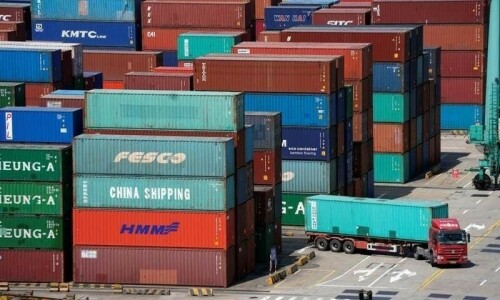In July 2024, the first month of the new fiscal year FY25, Pakistan’s trade deficit soared 19.7 per cent to $1.9 billion as imports grew much faster than exports. Month-on-month national consumer inflation in July hit an eight-month high of 2.1pc, when it is generally around 1pc.
Imports will surely continue to expand throughout this fiscal year and exports’ growth will likely remain slower than imports. This will widen the trade deficit and put additional pressure on the current account, increasing our reliance on home remittances.
However, inflation may start losing pace in the coming months as the interest rate cuts in May to 20.5pc and July to 19.5pc facilitate higher aggregate output in the economy. The challenge of containing food inflation — 4.5pc in urban areas and 3.6pc in rural areas in July 2024 — may, however, prove too difficult in the coming months.
The reason for this is not only the time lag it requires for easing inflationary pressures through monetary easing but also the fact that food exports are growing too fast. Higher food exports are sure to keep food prices under pressure throughout this fiscal year also because of the experiments being made, albeit half-heartedly, to tax agricultural income.
Between a growing trade deficit, export-related structural weaknesses and ongoing geopolitical tensions, the government is frantically trying to keep Pakistan’s economic outlook on track
The goods imports bill rose to $4.3bn in July this year from $3.7bn in July last year as the government and the State Bank of Pakistan eased most of the import restrictions that were in place for two years. Further import easing is on the cards to meet the International Monetary Fund (IMF) conditions for a new 37-month $7bn loan. Besides, import easing is also necessary for boosting exports and for facilitating the wholesale and retail sectors of the economy.
Structural weaknesses in the export sector like low productivity, lesser product diversification and value-addition and high dependence on few export markets may limit exports growth.
In addition to this, the ongoing unprecedented increase in energy prices and imposition of higher taxes across all sectors of the economy, barring agriculture, may hinder growth in exportable industrial products. Consequently, the trade deficit will continue to expand.
Amongst the available options for financing, remittances hold potential.
But two factors may challenge the potential rise in remittances as well. Saudi Arabia and the United Arab Emirates (UAE), two significant host countries of the Pakistani diaspora, are growing frustrated with the quality of the Pakistani labour force. We may see the number of people going for work there decrease this year as compared to the last year.
Besides, companies in both countries have already started hiring unskilled workers from other countries who they think behave better than Pakistani employees. Pakistan may, however, continue to export semi-skilled and skilled workers as well as professionals to these two and other Gulf Cooperation Council (GCC) countries.
The Middle East crisis has deepened with the killing of the visiting Hamas leader Ismail Haniyeh in Tehran. The event may lead to a military conflict between Israel and Iran, with horrifying effects on regional and international politics and the economy. It would be unwise to expect exceptional growth in remittances from the GCC region amidst this situation.
Moreover, without an exceptional increase in remittances — between 15pc and 20pc — fixing the increased goods’ trade deficit will be too difficult during this fiscal year. Remittances grew 10.7pc to $30.3bn in the last fiscal year, powered primarily by a greater export of work force. It would be naive to expect even an equal increase in remittances in the second consecutive year due to the base effect.
Pakistan’s economic performance in this fiscal year depends largely on broad factors such as whether the country can keep its strong, friendly relationship intact with China, Saudi Arabia, UAE and Qatar, and what role it plays in the ongoing Middle East political and military crisis. So far, indications are that the above-named countries are willing to support Pakistan by rolling over its debts, providing our external economy breathing space.
But dramatic changes in geopolitics and Pakistan’s positioning and posturing would be important to determine which of the four countries would still like to remain unconditionally supportive.
Similarly, Pakistan has so far been able to keep its ties with the US and the West from deteriorating amidst the Middle East crisis — a key, unwritten condition for enjoying the IMF bailout. But will it be possible for Islamabad to remain steady on this path in future if the military standoff between Israel and Iran morphs into a fully-fledged regional war? Only time will tell.
That is probably why we see “the melting of ice” between the PTI and the military establishment. And that is why we see eagerness on the part of the ruling political parties, PPP and PML-N, to seek broader political consensus in the country.
The recent surge in terrorism in Pakistan, especially in Khyber Pakhtunkhwa and Balochistan, also indicates that opposing regional and international forces once again want to ensure that Pakistan behaves in a certain manner as the grand politico-military conflict in the Middle East unfolds further.
The higher ups, not oblivious to these ground realities, is desperately working openly, and behind closed doors, to mitigate geopolitical challenges, both diplomatically as well as by trying to create a stable political environment in the country.
International rating agencies like Fitch and Standard & Poor’s are taking an optimistic view of the future of Pakistan because they are aware of the efforts going on to keep Pakistan on the right track.
Published in Dawn, The Business and Finance Weekly, August 5th, 2024

































